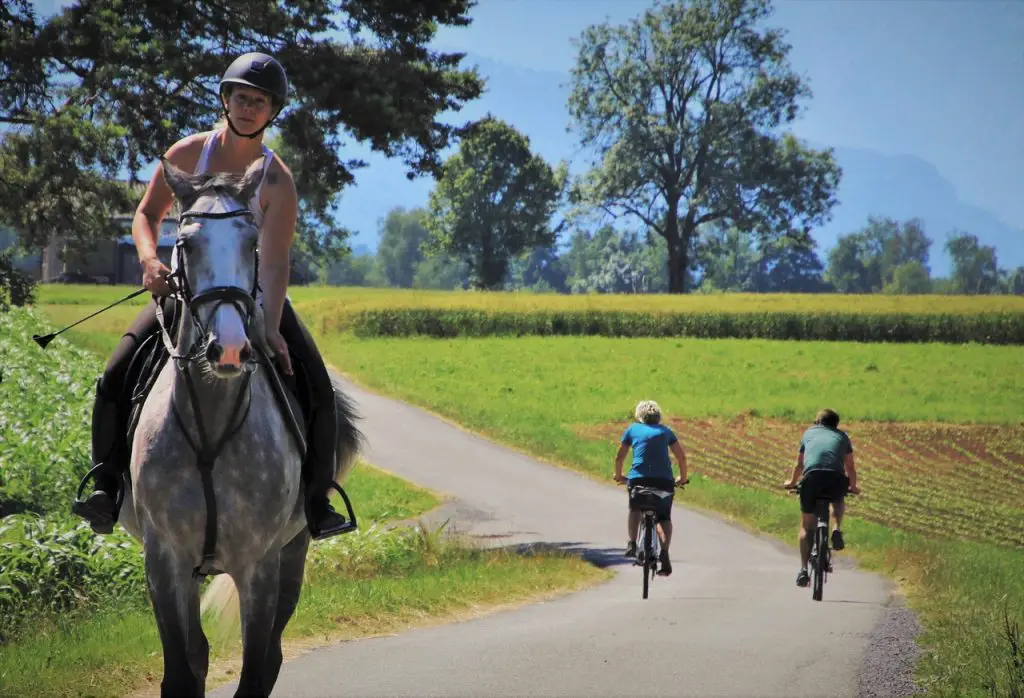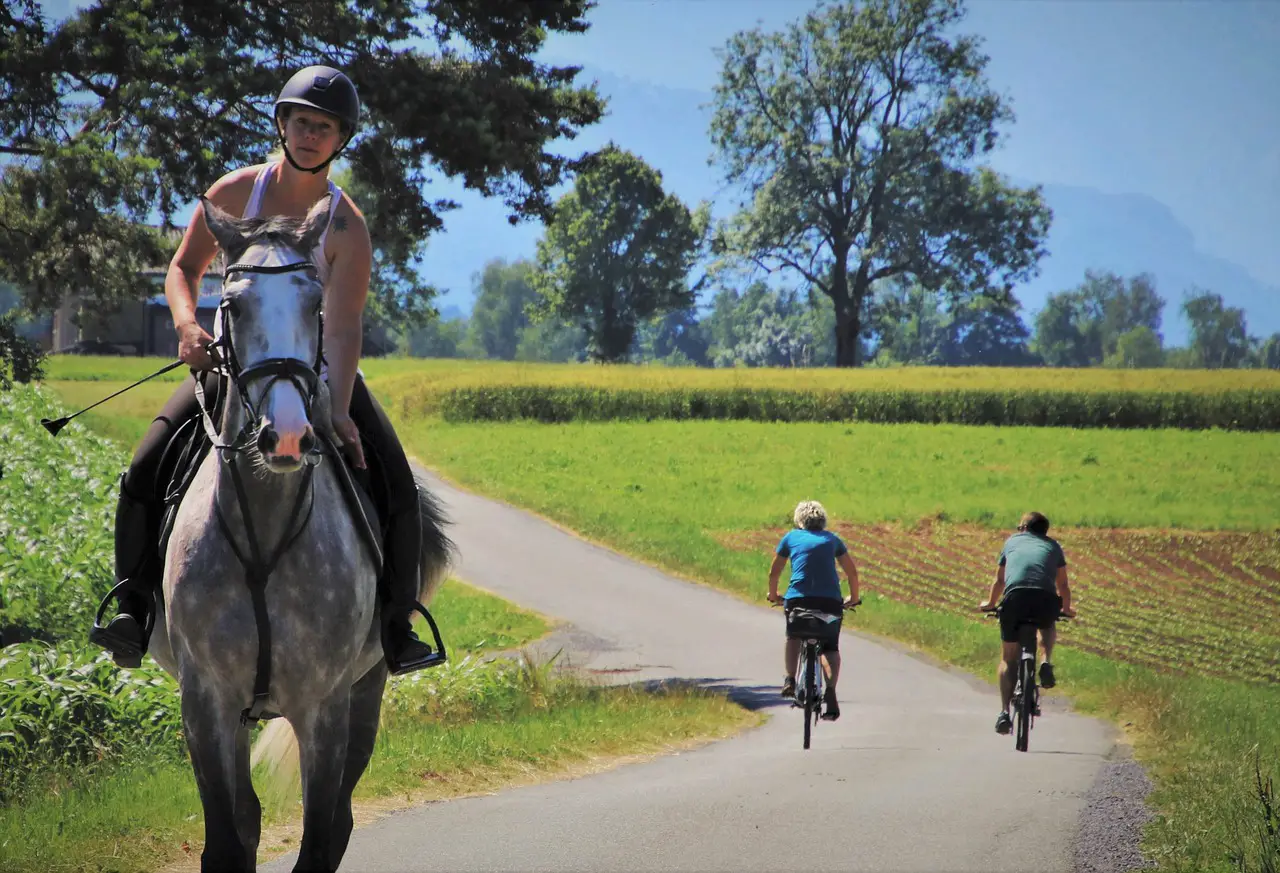Last Updated on February 24, 2022 by Allison Price
You may need to ride your horse on roads if you don’t have access to trails or maintained arenas.
It’s legal in most areas to ride your horse off-property down a country lane.
Be careful! You should plan ahead before you get on the road. Make sure you are familiar with local traffic laws and equine regulations.
Legality of Riding on the Road
Each state, county and town has its own rules and regulations regarding the legality and safety of riding your horse on roads.
Although there are no federal laws that prohibit you from riding your horse down streets in cities, it is important to follow all local laws.
Horses as vehicles vs. horses as livestock
Horse laws are generally considered livestock. They govern their care, slaughter, and liability.
However, these laws do not apply to horses that are being ridden or driven in an “equine activity”, or managed as a loose herd.
Traffic laws generally govern horses being driven or ridden on the roads. They share the road with motorized cars and must be treated accordingly.
Although individual rules may differ from one region to another regarding when and where your horse can be ridden, the general rule is that you are allowed to ride your horse on roads unless otherwise stated.

Sleighs and horse-drawn carriages are considered “slow moving vehicles” and are subject to traffic laws. There are exceptions to the rule for carriages, usually in relation to tourism.
You can drive your horse and buggy to the corner shop, but you will need a commercial license to transport passengers.
Equestrian Licensing
A license is not required to ride a horse. However, it may be necessary to drive a buggy in certain areas, take others on a trail ride or pick up passengers in a carriage.
You don’t have to get a license if you are just going to follow the trail (which may include sections of road),
General Rules for Drivers
There are laws in many states to protect horses on the roads. Some are more extensive than others. Here’s a New Hampshire example:
“Every person in control of or in charge of a vehicle shall, whenever they are approaching any horse, drive and manage such vehicle in such an manner as to avoid the frightening of such horse and insure the safety of all persons riding or driving it.” ( source
Vehicles must yield to horses and not cause fear to them.
General Rules for Riders
Equestrians must ensure they adhere to traffic laws and all signage. Highways and train tracks are usually off limits, as well as many bridges and train paths. Avoid busy intersections and use equestrian crossings whenever possible.
Most states require that you ride on the right-hand side with traffic flow (except for Colorado where you must ride left). If you are riding in a group, ride in single file and as close to the shoulder as possible. (source)
It is Illegal to Ride in Certain Places
Although there are not many laws that prohibit riding on roads, it is important to be aware of the local rules. These are just a few examples of traffic laws that may be applicable (although it is not an exhaustive list) ( Source).
- Louisiana – Don’t tie your horse up to a tree or allow him to stand in an area that could endanger it (the tree, and not the horse). It is not allowed to ride on paved highways. (source)
- Alabama – Don’t stake horses or other livestock on the right-of way on a highway.
- Idaho and Mississippi: Bridges must be crossed at a speed of no more than a walking pace. The penalty for violating Mississippi law since 1857 is $5, unless there is a posted sign. In that case, the fee is waived. (source)
- Nevada: No “reckless” riding.
- Kentucky New Jersey Pennsylvania, New York – No racing on the roads.
- Kentucky – Don’t ride your horse over a levee.
Although most states don’t have laws prohibiting riding on state highways in their entirety, equestrians must still follow the rules of road (most highways exclude pedestrians and horses).
Always obey all signage while riding your horse . This is for the safety and well-being of both you and other drivers . When possible, cross your horse on equestrian paths. Do not ride on sidewalks or other areas that are only for pedestrians.
Locate the laws in your state
It can be difficult to navigate the laws and statutes of your state. Although consulting a lawyer may be your best option, it is not necessary to search for specific laws in your state.
This table contains a link to each state’s legislative search page. To get the best results, search for traffic statues using terms such as “animal riding”, “horse riding,” or “livestock” to find them.
Even if you don’t get all the legalese, it’s legal to ride your horse on the roads in most areas. As long as you are safe.
Safety First
Safety precautions must be taken when you share the road with motor vehicles, even if you are legally allowed to drive. These are the basics ( source ):
- Use appropriate trails and bridge paths, and don’t speed.
- You should plan ahead. Avoid roads if possible. Choose a route with less traffic, wider shoulders and no blind corners.
- Bright, reflective clothing is a must. This is the perfect time to get out all the flashy gear you have. You’ll be more likely to avoid an accident if you can be seen by a driver as quickly as possible.
- Spend time with your horse training and making sure that he is ready for the open roads. You will be riding on roads frequently, so take your time to train your horse. Teach them how to deal with spooking, without letting you run into the street. (source)
- Always wear your helmet and use the buddy system
Avoid Dangerous Situations
Even though your horse must obey traffic laws, it is not possible to get a ticket for running a red light or speeding. You also can’t be pulled over for riding your horse legally in an area where you are allowed.
However, you can still be punished for riding your horse in recklessness or violating traffic laws.
Don’t ride and drink – Horseback riding while under the influence
The majority of DUI and DWI laws are applicable to those operating motor vehicles while under the influence. This may or may not apply when riding a horse.
Some states have a history of people being convicted or charged with driving under the influence, driving while intoxicated, and riding their horses drunk.
They were also found guilty of public intoxication and other offenses in states where riding a horse after having had a few beers is not technically illegal. (source)
Texting while horseback riding
The same rules would apply in today’s tech-savvy society to texting and using your phone while riding, as it does while driving. However, these laws can vary from one state to the next.
In general, if it is illegal for drivers to do so, then it should be illegal for horses on the road.
Other legal consequences
You should not do anything that could endanger the safety of your horse or yourself, even if you aren’t charged with DUI/DWI.
You could be held responsible for any damage to property or vehicles caused by an accident.
If you are caught riding your horse under the influence, you could be charged with animal or public endangerment. (source)



